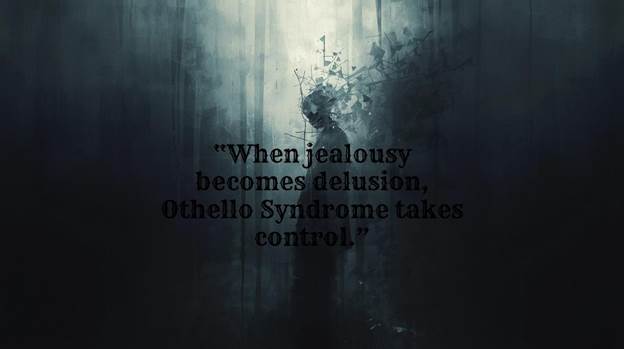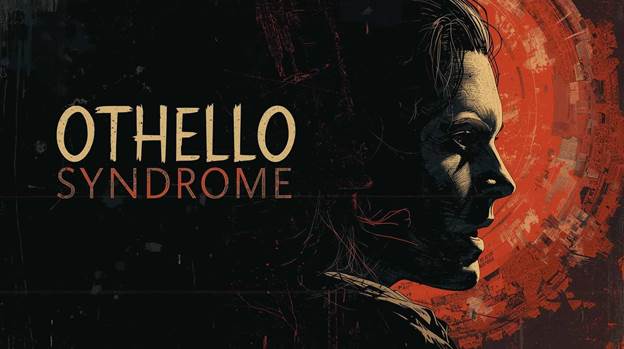This extreme form of jealousy is known as Othello Syndrome, a psychiatric condition where a person develops delusional beliefs that their partner is unfaithful despite no evidence. Jealousy is a common human emotion, but when it grows into an uncontrollable and irrational belief, it can damage relationships and mental well-being.The term comes from Shakespeare’s tragic play Othello, where the protagonist is consumed by jealousy and suspicion. In modern psychology, Othello Syndrome is recognized as a serious mental health issue that can lead to emotional distress, strained relationships, and in severe cases, harmful behavior.
Table of Contents
This article explores the definition, history, causes, symptoms, challenges, and management strategies of Othello Syndrome to provide a clearer understanding for individuals, families, and caregivers.
Othello Syndrome: Definition and Core Characteristics
Othello Syndrome is also called delusional jealousy. It is categorized under delusional disorders in psychiatry. Unlike normal jealousy, which may arise from real situations, Othello Syndrome is based on false beliefs resistant to logic and reassurance. A person with this condition is convinced their partner is cheating, even without any evidence.
Key features of Othello Syndrome include:
- Persistent suspicions of infidelity without proof
- Frequent questioning and interrogation of a partner
- Excessive monitoring of phone, messages, or whereabouts
- Emotional outbursts or aggressive behavior when reassured otherwise
This disorder differs from ordinary insecurity because it is deeply rooted in irrational and obsessive thinking, making it resistant to reasoning.
Historical Background of Othello Syndrome
The name Othello Syndrome was inspired by Shakespeare’s play, where Othello’s tragic downfall stems from jealousy. However, the medical recognition of this syndrome came much later. In the 1950s, psychiatrists began describing cases of pathological jealousy as a mental health disorder. Since then, it has been studied under psychotic and delusional disorders, with links to conditions such as schizophrenia, alcoholism, and neurological diseases.
The cultural association with Shakespeare highlights how jealousy has long been observed as a destructive force. Modern psychology, however, separates normal jealousy from the irrational patterns found in Othello Syndrome.
Symptoms of Othello Syndrome
Recognizing symptoms is important for timely intervention. Common signs include:
- Constant accusations of cheating
- Misinterpretation of harmless events as proof of infidelity
- Repeated surveillance of a partner’s activities
- Sudden mood swings linked to suspicion
- Aggression or violence in severe cases
In many situations, individuals with Othello Syndrome also experience anxiety, depression, and social isolation. Their irrational fears may push loved ones away, creating further emotional damage.
Causes of Othello Syndrome
Like many mental health conditions, Othello Syndrome arises from a combination of factors:
- Neurological issues: Damage to the frontal lobe or conditions like Parkinson’s disease have been associated with delusional jealousy.
- Substance abuse: Alcoholism and drug misuse can worsen paranoia and obsessive thoughts.
- Psychiatric disorders: Schizophrenia, bipolar disorder, and severe depression may increase vulnerability.
- Personality traits: Insecurity, low self-esteem, and controlling behavior can contribute.
- Trauma: Past experiences of betrayal or abuse may trigger irrational fears in relationships.
Understanding these causes helps professionals design effective treatment plans tailored to individual needs.
Real-World Examples of Othello Syndrome
Consider a man who repeatedly accuses his wife of infidelity every time she receives a text message. Despite showing him the sender’s identity, he remains convinced she is lying. Another example involves a woman who follows her partner to work daily, convinced he is hiding another relationship. These cases illustrate how Othello Syndrome is not about occasional jealousy but rather about delusions that dominate thinking and behavior.

Challenges in Managing Othello Syndrome
Managing this condition is complex due to several challenges:
- The individual often refuses to accept that their beliefs are irrational
- Constant reassurance from the partner can reinforce obsessive thinking
- Stigma around mental health may prevent families from seeking help
- Risk of aggression or violence requires careful monitoring and intervention
These challenges underline why professional guidance is crucial in dealing with Othello Syndrome.
Treatment and Coping Strategies for Othello Syndrome
While Othello Syndrome is difficult to manage, effective treatments exist:
Professional Approaches
- Cognitive-behavioral therapy (CBT): Helps reframe irrational beliefs and improve coping skills.
- Medication: Antipsychotic drugs or antidepressants may reduce delusional thinking.
- Couples therapy: Assists partners in rebuilding trust and communication.
- Hospitalization: In severe cases, especially with violent tendencies, hospitalization may be necessary.
Self-Help and Supportive Strategies
- Encouraging open, calm communication in relationships
- Avoiding excessive reassurance that may fuel obsessive thoughts
- Building social support networks through family or community groups
- Practicing stress management techniques like mindfulness and relaxation exercises
These approaches can reduce symptoms, improve relationship stability, and enhance overall well-being.
Importance of Early Intervention in Othello Syndrome
Seeking help early can prevent long-term consequences such as broken relationships, emotional trauma, or violence. Benefits of timely treatment include:
- Restoration of trust in relationships
- Reduction in obsessive and paranoid behaviors
- Improved quality of life for both the individual and their partner
- Better emotional regulation and reduced anxiety
- Stronger communication and problem-solving skills
Conclusion
Othello Syndrome is more than ordinary jealousy it is a psychiatric condition rooted in delusional beliefs that can deeply harm relationships and emotional health. By understanding its symptoms, causes, and challenges, individuals and families can recognize when professional help is needed. With therapy, medication, and supportive strategies, it is possible to manage this disorder and restore harmony in relationships. Greater awareness of Othello Syndrome encourages compassion and reduces stigma, ensuring those affected receive the care they need.






One comment on “Othello Syndrome: Understanding Delusional Jealousy in Relationships”